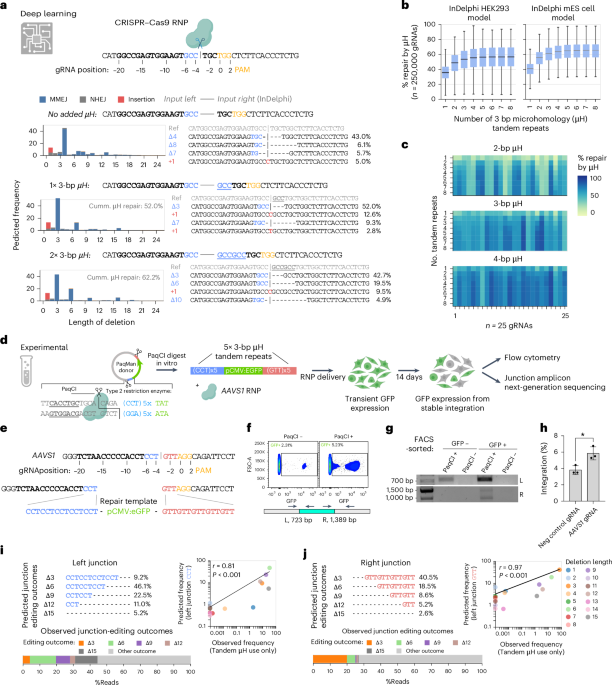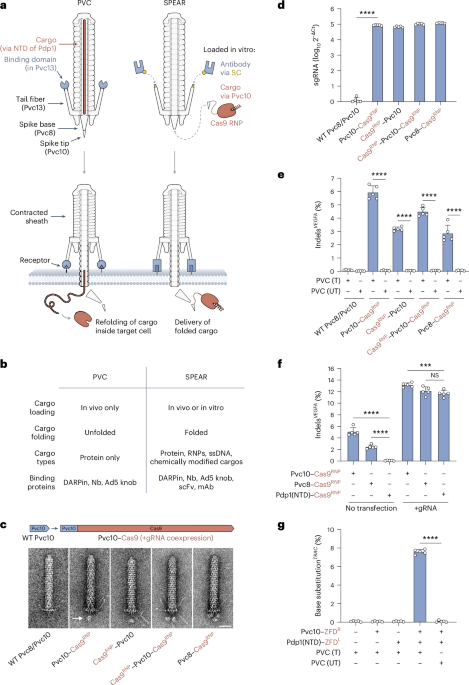Now Reading: Deep Learning Enables Precise Genome Editing with Microhomology Templates
-
01
Deep Learning Enables Precise Genome Editing with Microhomology Templates
Deep Learning Enables Precise Genome Editing with Microhomology Templates

Quick Summary:
- CRISPR-Cas technology enables precise genome editing,including the insertion of transgenic DNA cassettes.
- challenges persist in avoiding unintended genomic changes at transgene borders using techniques like nonhomologous end joining (NHEJ) and microhomology-mediated end joining (MMEJ).
- Natural DNA repair mechanisms, such as MMEJ, can result in mutations. Predictable repair patterns are enabled by algorithms like inDelphi and deep learning models.
- Experiments demonstrate successful integration using tandem repeats of microhomologies (µhs) for targeted repair at specific genome sites.
- Specific design rules were developed to enhance CRISPR efficiency, including sections targeting rapidly replicating vertebrate embryos and non-dividing neuronal cells.
- Methods tested include linearized donor templates with synthetic µHs to improve efficiency and accuracy of integrations.
Indian Opinion Analysis:
India has a growing biotechnology sector with vested interests in advancements like CRISPR-Cas. The findings presented regarding predictable editing outcomes and enhanced integration methods could benefit India’s initiatives in genetic research-spanning agriculture, healthcare innovations such as gene therapy for rare diseases, or engineered crops resistant to pests. The emphasis on leveraging deep learning tools signals a critical intersection between AI technology development and biotech progress within India’s scientific framework.
As India seeks global leadership in innovation-driven biotechnology efforts under programs like “Make In India,” prioritizing research infrastructure capable of deploying these advanced techniques is essential. Furthermore,ethical oversight becomes vital given implications for human health or biodiversity when applied broadly.
Quick Summary
- Researchers explored a novel CRISPR-Cas9 based gene-editing mechanism using microhomology (µH) tandem repeat arms to improve DNA integration efficiency and safeguard genomic integrity.
- Experimental data showed targeted integration efficiency influenced by sequence context, especially the nucleotide at position -4 near the double strand break. Guanine at this position resulted in better outcomes compared to other bases.
- µH arms reduced genome trimming during integration compared to non-homology mediated methods like NHEJ. Over 50% of reads were free from deletions.
- In vivo experiments yielded stable gene integrations in Xenopus tropicalis embryos, demonstrating potential for use as a precise transgenic tool.
Indian Opinion Analysis
This study’s breakthrough highlights increasing precision in gene-editing methodologies, which could prove transformative for biomedical applications. For India, where genetic research is advancing rapidly but still acts within constrained resources, such developments prompt critical implications. Firstly,techniques reducing unintended genomic alterations are crucial given India’s work on genetically engineered crops and targeted therapies with utmost safety concerns.
moreover, large-scale adoption by Indian labs will rely on education about optimal design strategies-such as nucleotide selection-to ensure efficacy while mitigating costs related to errors or inefficiencies. The study also suggests that machine learning tools can further optimize editing which aligns well given domestic AI interests bubbling strong across ecosystems
Quick Summary
- The article explores innovative genome editing techniques using CRISPR-Cas systems, focusing on mechanisms like µH tandem repeat-mediated integration and MMEJ repair.
- Examples studied include Xenopus tropicalis embryos for efficient transgenic integration and tissue-specific expression in renal tubules,muscles,brain cells,etc.
- Stable transmission to progeny across generations in frogs was achieved with tissue-specific markers for kidneys or cardiac cells showing strong functionality.
- The success of endogenous protein tagging applications was demonstrated by labeling proteins in genes like myh9, acta2, and neuronal markers such as Tubb2a.
- Applications extended to mice brains using adeno-associated viral vectors for fluorescent protein tagging at neuronal loci-this enabled visualization through advanced imaging methods.
Indian Opinion Analysis
The developments described offer immense promise for advancements in genetic engineering.India’s scientific community could leverage these findings with implications ranging from fundamental biological research to biomedical therapy innovations. Such as, precise transgene integration provides a pathway toward personalized medicine approaches critical in treating hereditary diseases. Meanwhile, breakthroughs observed in neuroscience tracking (Tubb2a) help underpin future studies into neurodegenerative conditions.
India must continue strengthening partnerships between academic researchers, biotech startups, and global collaborators actively working on CRISPR-enabled technologies. Ethical considerations remain key: With genetic modifications possible at both therapeutic levels (human health) and ecological contexts (agriculture), the governance structures here need robust regulation paralleling innovation pathways while enabling socially inclusive benefits.
Read moreQuick Summary
- Researchers optimized CRISPR genome-editing strategies using inDelphi, a predictive model.
- The study introduced “Pythia,” leveraging computational matrices for precise repair-template designs.
- Experiments demonstrated increased editing efficiency in mouse brains and Xenopus embryos by utilizing µH tandem repeats and single-strand DNA templates (ssODNs).
- Results showed up to 18% gene-editing success for eGFP-to-eBFP conversions, with correlation to template designs predicted by Pythia scores.
- In vivo tests revealed viable approaches for silent mutations but highlighted toxicity risks at higher ssODN template lengths.
Full size images available: 20252771Fig6HTML.png”>Figure 6.
Indian Opinion Analysis
This advancement represents a step forward in precision genome editing, which could considerably enhance biomedical research and therapeutic interventions worldwide, including India’s healthcare sector focused on genetic disorders like sickle cell anemia or thalassemia. The study addresses critical challenges of incomplete edits or collateral damage during CRISPR processes-a key concern for scalable use in both lab settings and eventual clinical applications.
For Indian researchers, access to tools such as Pythia may bolster ongoing studies aimed at solving agricultural inefficiencies via genetically edited crops or improved animal husbandry techniques-fields essential to food security given India’s growing population needs.
While promising, ethical dilemmas surrounding human germline editing persist globally; policymakers must balance innovation against potential misuse before introducing widespread regulations embracing AI-guided CRISPR improvements like those seen here.
Read more here:Quick Summary
- Recent advancements in CRISPR gene-editing techniques center around µH tandem repeat-mediated integration and deep learning models.
- µH integration offers precise,directional,single-copy gene modification without drawbacks like positional effects associated with other transgenesis methods.
- The approach was tested successfully on human cells, mice, and Xenopus embryos with predictability improvements over traditional NHEJ methods.Efficiency rates for targeted repair are modest but align with similar systems in zebrafish embryos.
- Limitations include dependency on double-strand breaks (DSBs), which can cause DNA rearrangements and activate the p53 pathway; off-target editing remains a concern despite mitigation strategies using prediction algorithms.
- Potential applications span gene therapy contexts such as retinal or neural tissues where HDR is inefficient or inactive.
- Deep learning tools like Pythia offer predictive scores to optimize repair outcomes through sequence-context specificity; their methodology could refine genome rewriting further by training cell-specific models.
Indian Opinion Analysis
The research brings notable optimism for India’s biotechnological sector as it highlights precise designs for CRISPR-mediated genetic modification, enabling deeper precision medicine capabilities and avenues for disease correction strategies like gene therapy. Despite challenges such as low efficiency rates or risks of DSB-induced rearrangements, leveraging AI-based predictive tools may enable safer clinical translation efforts while avoiding unintended edits-an issue particularly relevant given ethical debates about genetic manipulation globally. For India’s scientific community aiming at healthcare innovations, these findings provide valuable frameworks that could support exploratory treatment options tailored to local population genetics.Read more: Nature Article.
Quick Summary
- The article discusses CRISPR-Cas9-based gene editing methodologies and their applications in various organisms like Xenopus tropicalis embryos, mice, and other tissues.
- µH tandem repeat-mediated integration was employed to enhance efficiency in gene tagging and labeling experiments. Repair templates were generated using PCR for precise genome modifications.
- Experimental protocols involved transfection processes, optimized repair template concentrations, protein extractions via immunoprecipitation techniques, live imaging for fluorescence analysis, and computational modeling with tools like Pythia Python scripts for predicting repair outcomes.
- Thorough imaging techniques (e.g., mesoSPIM) were utilized for high-resolution visualization of genetic modifications post-integration. Immunostaining methods ensured theoretical accuracy in visualizations of the targeted proteins across different model systems.
indian opinion Analysis
The reported advancements demonstrate significant progress in molecular biology techniques such as precision CRISPR-Cas9 genome editing bolstered by computational methodologies like Pythia modeling-a critical step towards enhancing therapies targeting genetic abnormalities (e.g., retinitis pigmentosa). While the technological insights are notable globally focus remains attaining accessibility ensuring India balancing indigenous development reliance outsourcesQuick Summary:
- Researchers developed a software tool, Pythia, to optimize CRISPR-Cas9 genome editing aimed at correcting single-nucleotide missense variants.
- Pythia calculated optimal repair templates for specific genetic mutations and was tested in vitro on human HEK293T cells and in vivo on Xenopus embryos for precision genome alterations.
- Experiments examined the use of short single-strand oligonucleotide donor (ssODN) templates across varying lengths to systematically evaluate repair efficiency.
- Findings from these experiments indicated targeted optimizations using the software significantly enhance genome editing accuracy compared to traditional methods.
- The study’s data is publicly accessible via NCBI BioProject PRJNA1282594, and supporting software tools are available on GitHub.
Indian Opinion Analysis:
The adoption of groundbreaking technologies like Pythia represents a leap forward in enhancing precision medicine capabilities globally. While this research highlights improvements in genetic correction mechanisms primarily applicable to medical research, its implications are also relevant for India’s biotechnology sector. With growing investments and talent availability in genomics and biotech industries, integrating such developments could position India as a major contributor to global genome-editing advancements. Importantly, understanding local bioethics frameworks will be essential before practical applications or clinical trials are conducted domestically.
Read more here: [source link]Quick Summary:
- This raw text primarily discusses various research references around CRISPR/Cas9 gene editing technology, highlighting methodologies and outcomes observed globally.
- Studies mention techniques such as microhomology-mediated end joining (MMEJ) for precision genomic editing across diverse organisms, including plants, zebrafish, and mammals.
- The citations span a wide range of applications involving DNA repair profiling, mutation predictions, and optimizing phenotype penetrance in embryos via cutting-edge genetic interventions.
Indian Opinion Analysis:
CRISPR/Cas9 innovations have significant implications for India’s biotechnology sector. The technology offers avenues for local researchers to tackle challenges like agricultural advancement via targeted genetic modifications or addressing congenital diseases prevalent within the population. Additionally, India’s push toward global competitiveness in scientific R&D aligns well with these advances when adequately supported through policy frameworks and funding mechanisms tailored to ethical practices in genome editing. Well-regulated adoption could place india at the forefront of next-generation biotechnological solutions suited for both domestic and international landscapes.
For further details: PubMed Central ReferenceQuick Summary:
- The provided raw text appears to be a complex list of scientific references related to genome editing technologies, integration strategies, and transgenesis research across a variety of model organisms such as zebrafish and Xenopus.
- Technologies mentioned include CRISPR/Cas9, TALENs, prime editing tools, I-SceI meganuclease-mediated transgenesis techniques.
- Research focus areas include gene knock-in methods, enhancer detection tools (ZED vector), multiplex genome editing strategies for CAR-T cell production without viral vectors, as well as studies on phenotypic impacts from human enhancer variants.
Indian Opinion Analysis:
Genome-editing advancements like those outlined in the source text could hold significant scientific potential for India.As the country grows its biotech infrastructure and deepens investment in genomics research through initiatives such as the Genome india Project or bioscience-focused institutes like CCMB or IISc Bangalore, application of these cutting-edge technologies may enhance precision medicine and agriculture. However guided by responsible ethics frameworks.core research strides stand capable pushingareas adaptability core genomic solution faithful urban rural biopotentials., Long-term Indian trends should align pathwaysstrength global leadership.safe genetic exploration transformative =’=’=”” nothing=”” speculative=””>Quick Summary
- The article focuses on advancements in genetic tools, particularly related to genome editing in zebrafish models and other biological systems.
- Several referenced studies highlight innovative methods like CRISPR-Cas9 gene editing and homology-independent targeted integration (HITI) for precision genetic modifications.
- Applications of these techniques include tissue-specific gene activation, disease modeling, CAR-T cell therapies, cellular mapping technologies, and therapeutic approaches targeting liver and retina cells.
- Improved DNA donor molecules have demonstrated increased efficiency for genomic edits via homology-dependent repair mechanisms.
- Studies also address the relevance of inhibiting 53BP1 protein to enhance CRISPR-mediated outcomes while minimizing off-target mutations.
Indian Opinion Analysis
advances in genome editing tools have significant implications for India in areas such as agricultural biotechnology, medical research, and pharmaceuticals. Improved precision with technologies like HITI or CRISPR-Cas9 can accelerate India’s capacity to innovate tailored treatments for hereditary diseases while ensuring scalability within local healthcare frameworks at lower costs.Furthermore, zebrafish transgenesis could empower Indian researchers with robust models to study developmental biology efficiently. The growing impact of such innovations underscores the need for strategic investments into genomic research facilities within India alongside ethical governance regarding gene-editing applications.
Read more: Follow published reference links aboveQuick Summary:
- The article discusses advancements in genome editing technologies, particularly CRISPR/Cas9 and its various modifications for precise DNA manipulation.
- Techniques such as HDR (Homology-directed Repair) are being employed to achieve targeted integration and mutation. Innovative methods like Prime Editing are improving efficiency and versatility in genetic modifications.
- Research publications highlight breakthroughs including high-yield gene editing in primary cells, safe harbor-targeted integrations for cell tracking, and modular tagging mechanisms using CRISPaint technology.
- Studies have leveraged ssDNA templates and small-molecule cocktails to enhance repair fidelity across species such as zebrafish, Xenopus laevis, and human cells.
Indian Opinion Analysis:
The rapid innovation surrounding CRISPR-based genome editing has significant implications for India’s biotechnology sector. As a global hub of pharmaceutical research, India can leverage these advancements for gene therapies aimed at treating inherited diseases or improving agricultural genetics through modified crops. Additionally, economic opportunities lie in cross-border collaboration on clinical trials that use cutting-edge techniques like Prime Editing or HDR-based approaches. However, ethical considerations regarding human germline editing could spark debates within india’s policy framework aligned with global standards on genetic engineering practices.
Read more: Link to sourceQuick Summary
- No factual news article about india was provided in the input text.
- The text consists of references from scientific studies, particularly concerning genome engineering, CRISPR technology, and related literature with links to Google Scholar citations.
Indian Opinion Analysis
The provided text does not contain direct details relevant to Indian news or commentary but rather a list of scientific journal entries and scholarly references. Genome engineering technologies, such as those referenced via CRISPR-Cas systems and base editing outcomes, perhaps hold transformational implications for India in fields like healthcare innovation and agriculture. India’s strides in biotechnology may benefit from integrating global research trends into domestic R&D frameworks to tackle chronic diseases or enhance food security sustainably.
For direct application or contextual relevance within India’s framework for genome and biotech advancements, further detailed reporting is necessary.
Read more: Read moreQuick Summary
- Researchers led by T. Naert, T. Yamamoto, S. Han, et al., have developed a deep-learning-assisted method for precise and predictable genome integrations using microhomology-based templates.
- The study is published in Nature Biotechnology on august 12, 2025.
- It builds upon advances in genetic engineering, leveraging computational techniques to optimize templates for genome editing with minimal off-target effects.
- The research was received on August 19,2024,accepted on July 10,2025,and made available online thereafter.
Indian Opinion Analysis
India’s biotechnology sector has been growing at a formidable pace in alignment with global trends.This development underscores the potential applications of AI-driven tools in advancing precision medicine and agriculture-fields that hold vital importance for India’s economy and public health sectors. However,implementing such cutting-edge methodologies poses challenges related to ethical genomics regulation and infrastructure adaptation within India’s scientific systems. A balanced approach prioritizing innovation alongside robust oversight mechanisms could provide significant benefits if this technology finds practical implementation domestically.
























